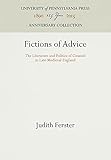Fictions of Advice : The Literature and Politics of Counsel in Late Medieval England / Judith Ferster.
Material type: TextSeries: The Middle Ages SeriesPublisher: Philadelphia : University of Pennsylvania Press, [2016]Copyright date: ©1996Edition: Reprint 2016Description: 1 online resource (216 p.) : 2 illusContent type:
TextSeries: The Middle Ages SeriesPublisher: Philadelphia : University of Pennsylvania Press, [2016]Copyright date: ©1996Edition: Reprint 2016Description: 1 online resource (216 p.) : 2 illusContent type: - 9780812233322
- 9781512805529
- Authors, English -- Middle English, 1100-1500 -- Political and social views
- Civilization, Medieval, in literature
- Didactic literature, English (Middle) -- History and criticism
- Education of princes in literature
- Kings and rulers in literature
- Politics and literature -- Great Britain -- History -- To 1500
- LITERARY COLLECTIONS / Medieval
- 820.9/358/09023 20
- PR275.D53
- online - DeGruyter
| Item type | Current library | Call number | URL | Status | Notes | Barcode | |
|---|---|---|---|---|---|---|---|
 eBook
eBook
|
Biblioteca "Angelicum" Pont. Univ. S.Tommaso d'Aquino Nuvola online | online - DeGruyter (Browse shelf(Opens below)) | Online access | Not for loan (Accesso limitato) | Accesso per gli utenti autorizzati / Access for authorized users | (dgr)9781512805529 |
Frontmatter -- Contents -- Acknowledgments -- 1. Introduction -- 2. The Context for Literature: Public Discourse in the Late Middle Ages -- 3. The Secretum Secretorum and the Governance of Kings -- 4. The Secretum Secretorum in Ireland -- 5. Council, Counsel, and the Politics of Advice -- 6. Chaucer's Tale of Melibee: Advice to the King and Advice to the King's Advisers -- 7. O Political Gower -- 8. A Mirror for the Prince of Wales: Hoccleve's Regement of Princes -- 9. Machiavelli's Prince -- 10. Conclusion -- Works Cited -- Index
restricted access online access with authorization star
http://purl.org/coar/access_right/c_16ec
Fictions of Advice historicizes the late medieval mirrors (or handbooks) for princes to reveal how the ambiguities and contradictions characteristic of the genre are responses to--as well as attempts to manage--the risks implicit in advising a king. Often thought of as moralizing advice unable to engage political conflicts, the mirrors for princes have been taken for dull and conventionalized testimonies to the medieval taste for platitude. Judith Ferster maintains that advice was at the center of one of the important political debates in the late Middle Ages: how to constrain the king and allow for his subjects' participation. Fictions of Advice rereads the English mirrors for princes to show how their moralizing was often highly topical and even subversive. Although overtly deferential to the rulers they address, the mirrors' authors were surprisingly capable of criticism and opposition. In putting the texts back into their historical contexts, Ferster reveals the vital cultural and political function they fulfilled in their societies.
Mode of access: Internet via World Wide Web.
In English.
Description based on online resource; title from PDF title page (publisher's Web site, viewed 23. Jul 2020)


